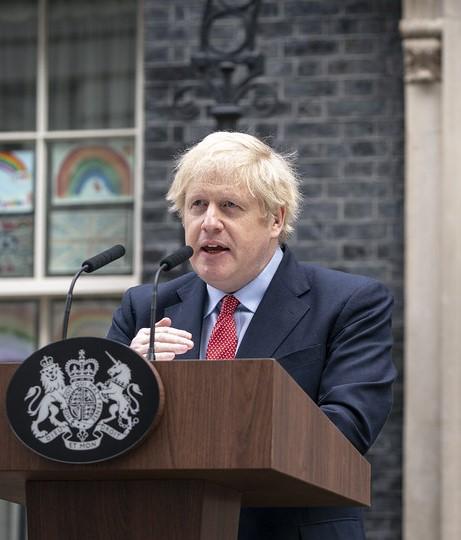In his first briefing since he was hospitalized with COVID-19, UK Prime Minister Boris Johnson said today that the country was past its peak and that he will release a plan to begin loosening restrictions next week.
Meanwhile, other countries such as Germany and Japan signaled extending their pandemic measures, while others noted that they have contained the virus and will start slowly scaling back their distancing steps.
UK mulls lockdown steps; Germany tweaks restrictions
In the UK, the world's fourth hardest hit country, Johnson said the plan will detail restarting the economy, resuming schools, and returning people to work, The Guardian reported. He added that the plan will hinge on protecting the health system, a continued fall in deaths and infections, addressing testing and protective equipment shortages, and ensuring against a second wave.
Elsewhere in Europe, after German Chancellor Angela Merkel met with the leaders of German states today, officials eased some restrictions, reopening churches, museums, zoos, and other public places, though states—some of which have been hit harder by the virus than others—can make their own decisions on opening, Deutsche Welle reported today.
Some religious events, such as weddings and wakes, are permitted, but several other distancing rules, such as a ban on large gatherings and shuttered restaurants, remain in place until May 10. Schools remain closed, and the government hasn't ruled out allowing sporting events to be played without spectators.
Czech Republic health officials said today that the country has contained its outbreak and will take the first steps to ease restrictions, Reuters reported. The daily number of new cases has been below 100 for 8 days in a row, and the reproduction number has declined to 0.7.
As a result, shops and services can start reopening, as well as nonurgent medical care. Smaller shops began reopening this week, and most activities will be allowed to resume some time between May 11 and May 25.
In Russia, where outbreak activity is escalating, health officials today reported 7,099 new cases, a record daily number, passing 100,000 cases. Ahead of early May holidays in Russia, the Kremlin is urging people to observe lockdown rules, CBS News reported.
Russian Prime Minister Mikhail Mishustin today announced that he has tested positive for the disease, the BBC reported.
Containment in Vietnam, emergency extension likely in Japan
In promising developments in Asia, Vietnam said it has contained its COVID-19 spread and limited cases to 270, with no deaths, Reuters reported yesterday. An analysis by the news service found that the country took early aggressive steps with testing and has the highest testing ratio in the world, 791 to every confirmed case.
However, it added the caveat that it couldn't independently verify the government's testing data. Vietnam also restricted travel into the country, ordered widespread quarantine, made public mask wearing mandatory, and stepped up contact tracing.
However, hospitals contacted by Reuters reported no increases in patients seeking care, and funeral homes reported fewer requests for funerals because of a drop in road deaths due to lockdowns.
Experts told Reuters that Vietnam's centralized government put it in a good position to respond to the outbreak, as did its open-market economy and experience dealing with other epidemics.
Meanwhile, South Korea—for the first time in 72 days—reported no new local cases, CBS News reported. However, the country's decline in cases will be tested by an upcoming 6-day holiday, which will feature holiday travel.
In Japan, however, the country will likely extend its state of emergency, which is set to end on May 6, Reuters reported, citing government sources familiar with Prime Minister Shinzo Abe's plans.
The emergency measures are in place for Tokyo, one of the country's main hot spots and seven prefectures. However, health officials are worried that Japan's low testing level has undercounted cases. Currently, it has recorded nearly 14,000 cases, 425 of them fatal. A seroprevalence survey in a Tokyo neighborhoods found that nearly 6% were likely exposed to the virus, a similar level seen in a study of patients at the city's Keio University Hospital.
Vaccine scale-up agreements, Comoros reports first case
In global vaccine developments, United Kingdom-based Astra Zeneca and the University of Oxford announced an agreement today to develop and distribute the university's candidate recombinant adenovirus vaccine against COVID-19, which entered phase 1 clinical trials last week. And US-based Inovio today announced that new funding from the Coalition for Epidemic Preparedness Innovations (CEPI) will expand large-scale manufacturing by German partner Richter-Helm BioLogics for its candidate DNA vaccine, also in phase 1 clinical trials, to battle the virus.
The global total today climbed to 3,255,454 cases from 187 countries, with at least 231,415 deaths, according to the Johns Hopkins online dashboard. Comoros today reported its first case, a contact of someone who had recently traveled to France, Al Jazeera reported.






















